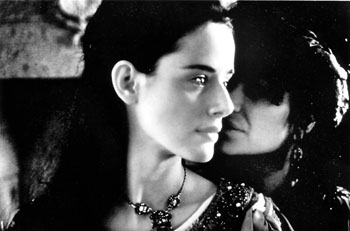![[Metroactive Movies]](/movies/gifs/movies468.gif)
[ Movies Index | Show Times | Silicon Valley | Metroactive Home | Archives ]
Queen Quirky: Pilar López de Ayala goes around the bend in 'Mad Love.'
La Vida Loca
History geeks take note: Queen Joan wasn't mad, she was just Castilian, in 'Mad Love'
By Richard von Busack
THE SPANISH soap-opera Mad Love takes a shot at reviving the woman's-picture costume drama, but it may be too late for today's audiences. Except for Shekhar Kapur's Elizabeth, very little in the field has succeeded of late. Even 1994's Queen Margot inexplicably failed to excite audiences, although it featured Isabelle Adjani masked and trolling for casual lovers on the ramparts of Paris. And I suppose the St. Bartholomew's Day Massacre wasn't good enough entertainment for you scruffs, either. Come to think of it, the public stayed away in droves from Intolerance, too, when D.W. Griffith staged that particular interfaith meeting.
Some, though, can't wait for films that begin with a cluster of velvet-gowned beardoes scattered by a travel-stained messenger who rushes in with the breathless news that "Frederick the Elector of Saxony is dead!" Math geeks (A Beautiful Mind) and philosophy geeks (Mindwalk) get their share; history geeks look up and are not fed. Unfortunately, Mad Love (a.k.a. Juana la Loca) isn't the film we've been waiting for.
The tale is a peculiarly uncinematic one: a story of a royal mope who spent most of her life entombed in a castle, brooding over the memory of her lost love, Philip of Hapsburg. Juana/Joan--who, historians agree, wasn't a victim of male perfidy but genuinely cuckoo-for-cocoa-puffs--may have really made her mark by foaling the Emperor Charles V, one of Europe's most important landlords. By bearing Hapsburg children, she also did her part for the cause of inbreeding.
The film opens with the old Joan, cloistered, contemplating Philip's portrait: "I perceive the odors of his armpits," she says in voice-over. It's a reverie an actress might just about get away with in bed, but not mooning over a painting. The film is also cloistered. It's almost all set in the gloomy Iberian court of Castile in the early 1500s, except for the parts that are set in the similarly overcast castle somewhere in the Lowlands.
Maybe this epic by Vicente Aranda is saying is that Joan wasn't mad, she was just Castilian. Joan (coltish Pilar López de Ayala) is an innocent girl shipped out to Flanders and given in marriage to Philip of Austria (Daniele Liotti, who wavers from ridiculously handsome to ridiculously ridiculous).
Joan's woes begin when the coldblooded locals don't seem to understand hot-blooded passion. The lady's public fuss over her husband's many infidelities amuses the court. But they stop laughing when Joan takes a pair of scissors to the fancy hair of a lady-in-waiting whom Joan noses out as one of her husband's lovers. When her mother dies, Joan heads back to Castile as the queen, with Philip as regent; they're escorted by her handpicked retinue of ugly ladies-in-waiting. Naturally, though, Philip finds sport there, as Juana simmers, boils and carries on like a mad woman.
Ferdinand and Isabella, Columbus' patrons and Joan's parents, steal the show. Isabella (Susy Sánchez) delivers a bitter-clever piece of double-meaning dialogue about how a royal marriage is endured. And Héctor Colomé as Fedinand grumbles his way through that reliable medieval movie prop, a giant roast turkey leg. This Ferdinand, taking with his mouth full, greedily slurping his wine, seems to be the only royal around with any interest in power. Pursuing the idea of nobles as people with a job to do might have livened up Mad Love better than the many bad sex scenes.
Philip has some bouts with a stacked Moorish belly dancer, Aixa (Maneula Arucri), who bewitches the lord with some kind of magic coin that invokes Satan. (Lesson: Muslims worship the devil.) Following her successfully cast spell, Aixa turns up at court pretending to be a Spanish noblewoman ... and Joan may be crazy, but she's not dumb. The peasants turn up exactly once. The queen, in trouble, appeals to her people. They troop into the castle, very orderly, and kneel; it's as if Her Majesty has been keeping all of her subjects in the wardrobe.
The writing is clubfooted ("The people give an enthusiastic welcome to their monarchs," intones the narrator, as we see the people give an enthusiastic welcome to their monarchs). And the direction is dead as a Spanish mackerel, right from the opening shot of a long procession that, at length, proceeds past a stock-still camera.
The film's moral--"I believe you're not in love if you're not jealous"--has little chance of appeal, except, maybe, to Prozac Nation author Elizabeth Wurtzel, who could twist Mad Joan into an inconvenient woman heroine who made her own law. Or maybe to that percentage of The Rules fanciers who are also Spanish history buffs.
Whoever takes a fancy will have to be unbothered by the coarse moments, like the ladies-in-waiting having a nipple-rouging party. Making Joan a creature who allowed herself to be walled up for love, goes beyond anti-feminist to antediluvian anti-feminist. History may not be bunk, but Mad Love sure is.
[ Silicon Valley | Metroactive Home | Archives ]
![]()

Photograph by Ignacio De Amo
Mad Love (R; 117 min.), directed and written by Vicente Aranda, photographed Paco Femenia and starring Pilar López de Ayala and Susy Sánchez, opens Friday at the Towne Theater in San Jose.
Send a letter to the editor about this story to letters@metronews.com.
From the September 5-11, 2002 issue of Metro, Silicon Valley's Weekly Newspaper.